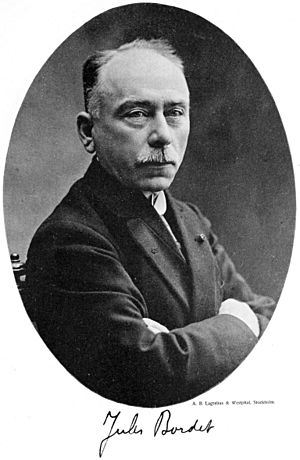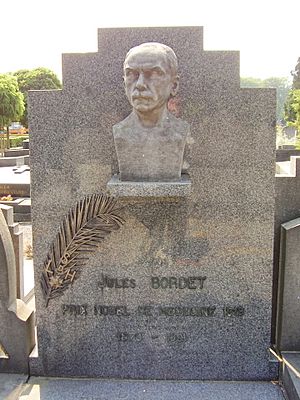Jules Bordet facts for kids
Quick facts for kids
Jules Bordet
|
|
|---|---|
 |
|
| Born |
Jules Jean Baptiste Vincent Bordet
13 June 1870 |
| Died | 6 April 1961 (aged 90) Brussels, Belgium
|
| Resting place | Ixelles Cemetery |
| Nationality | Belgian |
| Alma mater | Free University of Brussels |
| Awards |
|
Jules Jean Baptiste Vincent Bordet (born June 13, 1870 – died April 6, 1961) was a Belgian scientist. He studied how our bodies fight off diseases, a field called immunology. He also studied tiny living things like bacteria, which is called microbiology.
A group of bacteria, Bordetella, is named after him. He won the Nobel Prize in Physiology or Medicine in 1919. This award was for his important discoveries about how our immune system works.
Contents
Early Life and Education
Jules Bordet was born in Soignies, Belgium. He became a medical doctor in 1892 from the Free University of Brussels.
In 1894, he started working at the Pasteur Institute in Paris. He joined the lab of Élie Metchnikoff, another famous scientist. Metchnikoff had just found out that certain white blood cells can "eat" and destroy bacteria. This process is called phagocytosis.
Discoveries in Immunity
How Our Bodies Fight Germs
In 1895, Bordet made a big discovery. He found that our body's antibodies get a lot stronger at killing bacteria. This happens when certain natural parts of our blood are also present. He called these helpers "alexine." Today, we know them as complement. Think of complement as a backup team that helps antibodies do their job even better.
Four years later, in 1899, he saw a similar process. Complement also helps destroy foreign red blood cells. This happens when they are exposed to immune serum. This process is called "hemolysis," which means the cells burst open.
Founding an Institute
In 1900, Bordet left Paris and went to Brussels. There, he started his own research institute. It was similar to the Pasteur Institute. He kept studying how the complement system works to protect us.
Whooping Cough Discovery
In 1906, Bordet worked with another scientist named Octave Gengou. Together, they found a specific type of bacteria. They named it Bordetella pertussis. They showed that this bacterium causes whooping cough. Whooping cough is a serious breathing illness.
In 1907, he became a professor of Bacteriology at the Université Libre de Bruxelles.
Awards and Recognition
Nobel Prize and Other Honours
Jules Bordet received the Nobel Prize in Physiology or Medicine in 1919. This was for his important work on how our bodies become immune to diseases.
In March 1916, he became a Foreign Member of The Royal Society in London. In 1930, he gave a special lecture there called the Croonian Lecture. In this lecture, he talked about "bacteriophages." These are like "invisible viruses" that kill bacteria. He thought bacteria destroyed themselves. However, later research in 1941, using new electron microscopes, showed that bacteriophages do exist. This is an example of how science learns and corrects itself over time.
Bordet passed away in 1961. He was buried in the Ixelles Cemetery in Brussels.
- 1919: He became a member of the Royal Academy of Science, Letters and Fine Arts of Belgium.
- 1921: He received the Cameron Prize for Therapeutics of the University of Edinburgh.
Things Named After Him
The Bordet railway station in Brussels is named after him. Also, a cancer hospital, the Institut Jules Bordet, carries his name.
See also
 In Spanish: Jules Bordet para niños
In Spanish: Jules Bordet para niños
 | James Van Der Zee |
 | Alma Thomas |
 | Ellis Wilson |
 | Margaret Taylor-Burroughs |


